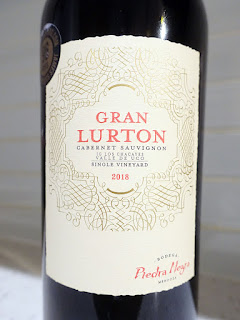red wine review is a lovely organic and vegan-friendly Agiorgitiko from Nemea in Greece. It arrived at the LCBO in last month's LCBO VINTAGES New Release Collection.
It is produced by Estate Papaioannou, a small, family-owned Greek winery situated in Ancient Nemea, within the Peloponnese wine region of southern Greece. While the Papaioannou family has deep viticultural roots in Nemea going back to the 19th century, the modern estate winery was established in the 1950s by Thanasis Papaioannou.
Mr. Papaioannou was one of the first wine producers who understood and promoted the idea that wine must maintain its unique characteristics - the grape variety, the vineyard's location, as well as the work in the vineyard, while ensuring biological balance. The family has about 60 hectares of private vineyards located in various vineyard plots within Nemea, and are planted to both Greek and international varieties. All the family's vineyards are 100% organically cultivated, with the aim of achieving ultimate harmony with the ecosystem. Thanasis Papaioannou passed away in 2019 at the age of 92.
George Papaioannou, son of Thanasis, carries on his father's tradition. As a chemist-oenologist, George is creatively active in his own vineyards, as well as in the modern winery of Ancient Nemea. The goal is for the continuous improvement of the wines produced, maintain the highest standards of hygiene and organic characteristics, as well as experiment with new types of wines. With vineyards situated in different areas of Nemea, which are characterized by differences in the ecosystem and age of the vines, the result is wines of multi-dynamism. The quality of the wine is further enhanced by the correct selection of a satisfactory number of varieties, along with the profound knowledge of its pioneers about everything related to the vineyard and its cultivation. With a commitment to sustainable practices, Estate Papaioannou has been farming organically since 2004. Papaioannou Winery is certified by the state-controlled DIO, and more recently achieved USDA NOP organic certification.
This red wine is crafted with 100% Agiorgitiko, a native Greek grape varietal which also often goes by the name St. George. The grapes for this wine were grown in their 60 hectare estate vineyard in Nemea, at 350 metres above sea level. The vines are 35-years-old and planted on clay soil with gravels, and trained using the Royat double cordon system. It was vinified by undergoing a cool temperature fermentation using indigenous yeasts, with 2 weeks of maceration time. The wine was matured for 12 months in 300 L American and French oak barrels, 50% new and 50% 1-year-old, followed by 6 months of bottle ageing.
The 2019 vintage in Greece is considered to be one of the best in the last 20+ years with consistent, evenly distributed rainfall, and without extreme periods of heat, which resulted in a high-acid vintage. In Nemea, low temperatures during winter and spring, combined with continuous rainfall, resulted in late maturation during all stages of ripening. The summer months and September experienced heat and drought conditions, which ensured good hygiene for most grape varieties. With normal yields and excellent grape health, the resulting wines are characterized by high acidity, which gives aromatic wines good varietal expression. From a very good vintage with high expectations, let's see how this 2019 Agiorgitiko from Nemea, Greece, is tasting tonight...
This organic Agiorgitiko is fragrant and open, with a medium-high intensity nose offering a lovely, complex mix of dark fruited spices revealing layers of black cherry, blackberry, sandalwood, and savoury earth aromas nuanced with touches of rose floral, dried cherry, and barnyard. On the dry, medium-full bodied palate it has oak spice, dark berry, black cherry, black plum, peppery spice, and smoky mineral flavours. It is well-structured with crisp and juicy acidity, as well as refined, gritty tannins. Touches of intriguing menthol notes on the back palate, while waves of black cherry, pepper, and oak spice notes lead to smoky minerals with excellent length on the crisp finish. Highly recommended buy! Score: 91 pts
One other wine by Papaioannou is available at the LCBO, while the full range can be ordered through their Agent - KOLONAKI Group of Companies.
It is produced by Estate Papaioannou, a small, family-owned Greek winery situated in Ancient Nemea, within the Peloponnese wine region of southern Greece. While the Papaioannou family has deep viticultural roots in Nemea going back to the 19th century, the modern estate winery was established in the 1950s by Thanasis Papaioannou.
Mr. Papaioannou was one of the first wine producers who understood and promoted the idea that wine must maintain its unique characteristics - the grape variety, the vineyard's location, as well as the work in the vineyard, while ensuring biological balance. The family has about 60 hectares of private vineyards located in various vineyard plots within Nemea, and are planted to both Greek and international varieties. All the family's vineyards are 100% organically cultivated, with the aim of achieving ultimate harmony with the ecosystem. Thanasis Papaioannou passed away in 2019 at the age of 92.
George Papaioannou, son of Thanasis, carries on his father's tradition. As a chemist-oenologist, George is creatively active in his own vineyards, as well as in the modern winery of Ancient Nemea. The goal is for the continuous improvement of the wines produced, maintain the highest standards of hygiene and organic characteristics, as well as experiment with new types of wines. With vineyards situated in different areas of Nemea, which are characterized by differences in the ecosystem and age of the vines, the result is wines of multi-dynamism. The quality of the wine is further enhanced by the correct selection of a satisfactory number of varieties, along with the profound knowledge of its pioneers about everything related to the vineyard and its cultivation. With a commitment to sustainable practices, Estate Papaioannou has been farming organically since 2004. Papaioannou Winery is certified by the state-controlled DIO, and more recently achieved USDA NOP organic certification.
This red wine is crafted with 100% Agiorgitiko, a native Greek grape varietal which also often goes by the name St. George. The grapes for this wine were grown in their 60 hectare estate vineyard in Nemea, at 350 metres above sea level. The vines are 35-years-old and planted on clay soil with gravels, and trained using the Royat double cordon system. It was vinified by undergoing a cool temperature fermentation using indigenous yeasts, with 2 weeks of maceration time. The wine was matured for 12 months in 300 L American and French oak barrels, 50% new and 50% 1-year-old, followed by 6 months of bottle ageing.
The 2019 vintage in Greece is considered to be one of the best in the last 20+ years with consistent, evenly distributed rainfall, and without extreme periods of heat, which resulted in a high-acid vintage. In Nemea, low temperatures during winter and spring, combined with continuous rainfall, resulted in late maturation during all stages of ripening. The summer months and September experienced heat and drought conditions, which ensured good hygiene for most grape varieties. With normal yields and excellent grape health, the resulting wines are characterized by high acidity, which gives aromatic wines good varietal expression. From a very good vintage with high expectations, let's see how this 2019 Agiorgitiko from Nemea, Greece, is tasting tonight...
Tasting Note:
ESTATE PAPAIOANNOU SAINT GEORGE AGIORGITIKO 2019 - Vegan, PDO Nemea, Greece (#27217) (XD) - $29.95This organic Agiorgitiko is fragrant and open, with a medium-high intensity nose offering a lovely, complex mix of dark fruited spices revealing layers of black cherry, blackberry, sandalwood, and savoury earth aromas nuanced with touches of rose floral, dried cherry, and barnyard. On the dry, medium-full bodied palate it has oak spice, dark berry, black cherry, black plum, peppery spice, and smoky mineral flavours. It is well-structured with crisp and juicy acidity, as well as refined, gritty tannins. Touches of intriguing menthol notes on the back palate, while waves of black cherry, pepper, and oak spice notes lead to smoky minerals with excellent length on the crisp finish. Highly recommended buy! Score: 91 pts
One other wine by Papaioannou is available at the LCBO, while the full range can be ordered through their Agent - KOLONAKI Group of Companies.













































